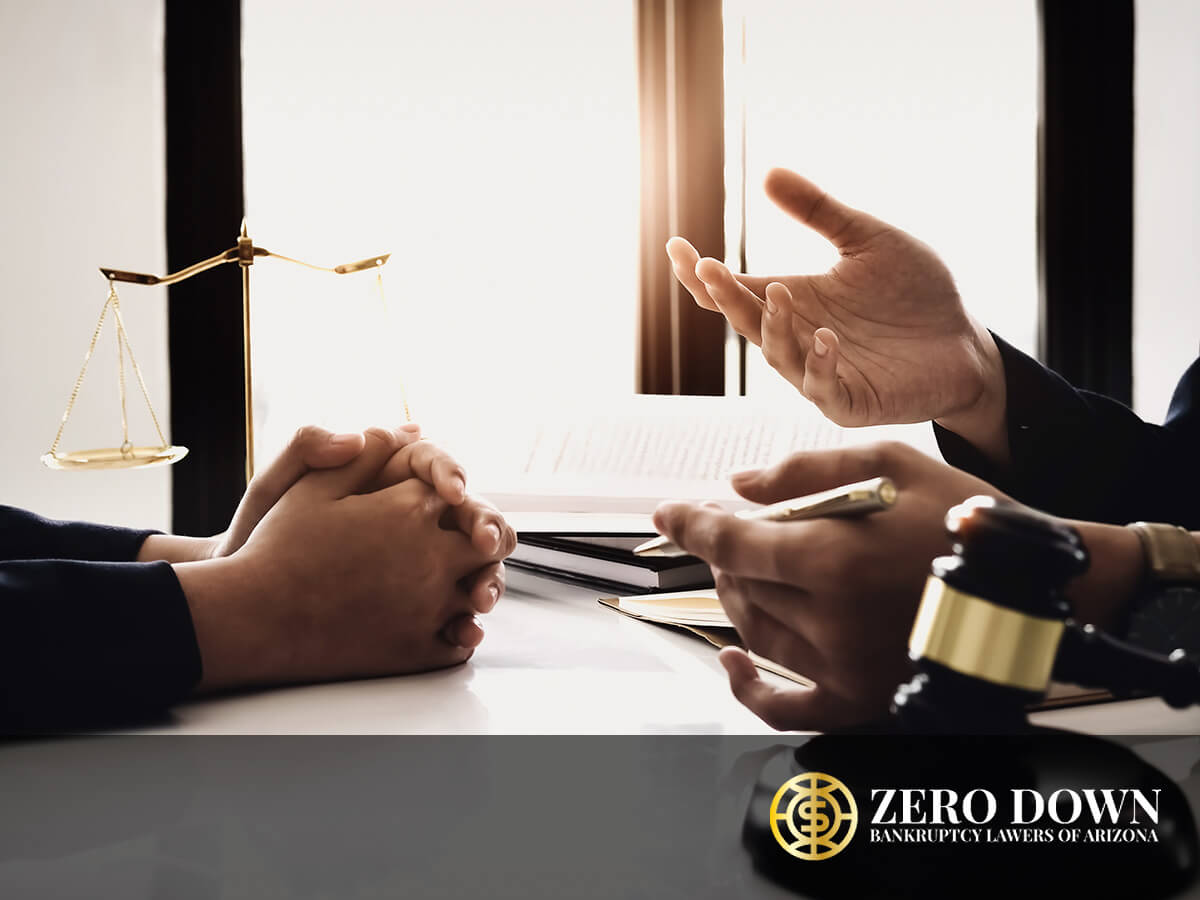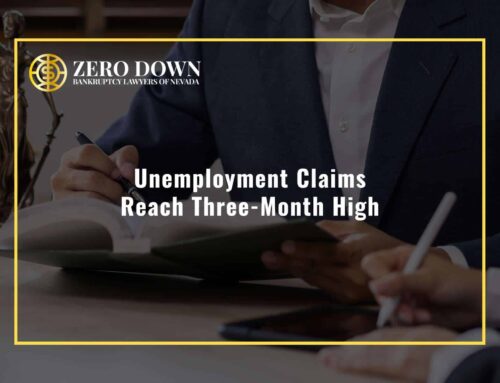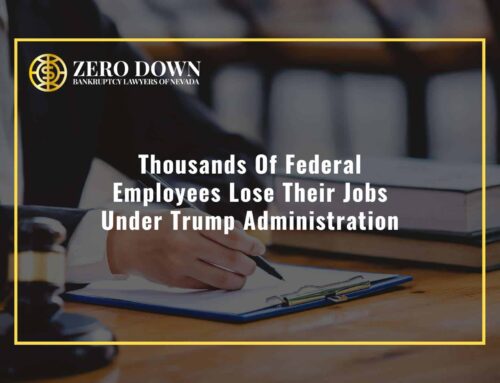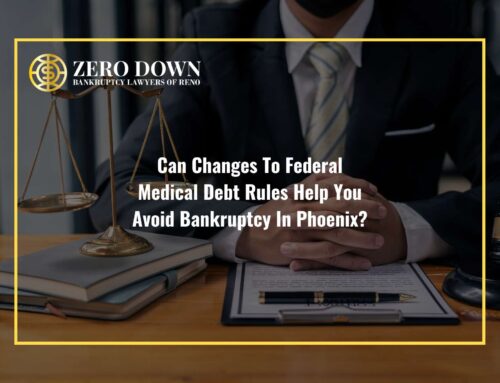Arizona Bankruptcy Attorneys Explain The Different Types Of Bankruptcy
Our Arizona Bankruptcy Attorneys discuss the different types chapters of bankruptcy and discuss the differences in the bankruptcy chapters. Also, our AZ BK Team offers advice to potential filers as to which chapter of bankruptcy to file that will be the most beneficial.
There are several types of bankruptcy, but most consumers choose between Chapter 7 and Chapter 13. Each has its own sets of benefits, drawbacks, restrictions, and requirements. You may only qualify for one chapter of bankruptcy, but several of our clients have the option between both. If you’re considering bankruptcy and don’t know if you should file Chapter 7 or Chapter 13, you should ask yourself the following questions before proceeding with your petition.

How Does My Income Compare To The State Median?
If your income is below the state median, you will automatically qualify for Chapter 7. To do this comparison, average your income, as well as your spouse’s, if applicable, over the past 6 months. Each state has tables showing the median monthly and annual income, which are organized based on number of family members. You will need to use the Means Test to qualify for Chapter 7 if you make more than the corresponding amount. Your position on the state median income line will also determine the length of your Chapter 13 payment plan: those who make less than the state median will have a 3 year plan, and those who make more will have a 5 year plan.
Am I Being Garnished For Domestic Obligations?
One of the biggest benefits of declaring bankruptcy is that you will be protected from your creditors by the Automatic Stay while your case is pending. There are a few exceptions, and one of the most important is that your bankruptcy may not stop your garnishment stemming from a child support or alimony debt. These garnishments will only stop if you file Chapter 13, and your payment plan arranges for the entire past due balance. Both bankruptcy chapters will stop all other wage garnishments.
How Much Are My Assets Worth? Are They Protected By State Bankruptcy Exemptions?
In Chapter 7 bankruptcy, your assets will only be protected if they fall within your state’s applicable exemptions. Your state will have specific exemptions for your house, car, electronic devices, and even your furniture and clothing. Any of your assets that are worth more than your state’s exemptions may be seized and sold, with the proceeds split among your creditors. You could also face additional fees or a case dismissal because of inaccurately applied exemptions. You must also use an exemption to protect your bank account on the day of filing, and some state’s bank account exemption is extremely low. These exemptions should factor into your decision if you have the choice between Chapter 7 and Chapter 13. You will not be constricted by state exemptions if you file Chapter 13 instead.
Are Most Of My Debts Credit Cards, Medical Bills, etc.?
If you do have the choice between both chapters, Chapter 7 may be more favorable if you mostly have unsecured nonpriority debts. Bankruptcies are run of the mill for these types of creditors, and they typically don’t put up the fight that other creditors might. However, there are restrictions on your credit card usage before a Chapter 7 bankruptcy filing. Luxury purchases and cash advances in the months preceding your bankruptcy can cause trouble in your case. Consult with a bankruptcy attorney if you have been relying heavily on credit cards before your bankruptcy.
Should I Consider Divorce? Would It Be Better To File Divorce Or Bankruptcy First?
Arizona is a community property state, so both spouses can be held liable for all debts incurred during their marriage. This might make it better to file bankruptcy before divorce, so you can spend less time and attorney’s fees during property division in a divorce. However, you may not be able to wait to file your divorce for the time it takes to file bankruptcy, or you may be able to qualify for Chapter 7 as a single earner when you wouldn’t while still married. Your assets will also be frozen by bankruptcy, which makes the property division portion of a divorce impossible to complete. Clearly there are a lot of factors to consider here, so you should consult with an attorney if you have multiple types of legal matters on the horizon.
Do I Have Cosigners On My Loans?
One issue with filing Chapter 7 is that if any of your loved ones cosigned on a loan for you, they will be saddled with the debt when your case is discharged. This could hurt that person’s credit, and possibly destroy your relationship. If you file Chapter 13 instead, you will pay off your cosigned loan, and your cosigner will not be affected. You should review your loan agreements if you can’t remember whether or not you have cosigners before declaring bankruptcy.
Do I Have A Second Mortgage On My Home?
If you have a second mortgage on your home, you may be able to discharge it in bankruptcy. Secondary mortgages may be discharged in Chapter 13 if the home is underwater, or there is more debt associated with the home than it is worth. This is also referred to as “lien stripping.” After lien stripping, a secondary mortgage loses its attachment to the collateral and is treated like any other unsecured debt. Depending on the balance of your secondary mortgage, this debt alone may make Chapter 13 your better option.
Contact An Arizona Bankruptcy Attorney For More Information
This list is non inclusive, and may require more careful analysis than a simple question for yourself. If you need additional guidance applying your state’s bankruptcy laws to your personal situation, our office is here to help. Our dedicated staff and attorneys have years of experience representing both Chapter 7 and Chapter 13 clients. This makes it easier for them to identify opportunities as well as potential hurdles in your case.
To learn more about your bankruptcy options, as well as to receive a quote for retaining our firm, call today to schedule your free consultation. We offer affordable payment options, and you may even qualify for our $0 Down payment plan. Take the first step towards financial freedom and schedule your free consultation today. Call or Text our Arizona BK Lawyers at (480) 833-8000.
Arizona Offices
Phoenix Location:
343 W Roosevelt Street, Suite #100
Email: [email protected]
Phone: 602-609-7000
Mesa Location:
1731 West Baseline Rd., Suite 101
Email: [email protected]
Glendale Location:
20325 N 51st Avenue, Suite #134
Email: [email protected]
Tucson Location:
Email: [email protected]










